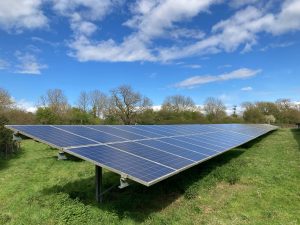
Labour may have won the general election by a landslide, but the results here in Wiltshire were somewhat more nuanced. Labour won in Swindon, while the Conservatives won some, and lost some. But the Liberal Democrats were the real newsmakers here, winning seats in newly created constituencies and existing ones.
I must admit to being somewhat relieved to see Conservative Brexiteer and solar opponent James Gray replaced by the climate-positive Dr Roz Savage, who went so far as to row solo across three oceans to raise awareness of environmental issues. Mr Gray can be praised for his public service across the decades but decried for his more blinkered views on renewables.
In a recent blog, Dr Savage outlined her vision for the constituency which would see a greater number of smaller, community energy-led solar projects which may be more palatable to residents than some of the proposals we’ve seen for sprawling solar parks. Her views on solar will no doubt be welcomed by one of her Tetbury Constituents, HRH King Charles, who has his cherished Highgrove home in her patch. He has just been granted planning to install 2,000 solar panels on grazing paddocks at his Sandringham estate, providing 1.1Mw of power and described as having a lifespan of 40 years.
Dr Brian Mathew and Sarah Gibson, the other two successful Lib Dem candidates, appear to be equally strident in their support for renewables, but it remains to be seen how much influence the new parliamentarians will have when Labour looks to enact its Energy Independence and Planning and Infrastructure Bills. I wait to see if Labour’s commitment to making Britain a ‘clean energy superpower’ by 2030 is just election rhetoric. They are sending out conflicting messages and whilst we have seen them scrap the ban on onshore wind, we have also seen Sec of State for Environment tell the energy industry he will not ban oil and gas drilling in the North Sea. There is confusion and I am still not sure if they will grant new licenses or if they are just honouring existing commitments?
During its campaign, the party pledged to double the size of the co-operative and mutual sector and outlined a plan to ‘fix the grid’ and insulate ‘millions of homes’ (still rather more vague than the 19 million they previously stated). Its manifesto endorsed its Local Power Plan, potentially giving local energy projects a lift with up to £400 million per year in low-interest loans for community projects, alongside £600 million per year of funding for local authorities to support local power generation. Let’s not forget, however, that this is the same Labour Party which did a complete U-turn on its £28 billion Green Prosperity Plan earlier this year…
If Starmer’s government is going to succeed, it must walk the talk on solar. Its focus on tackling grid connection delays will be vital if the UK is to reach 50GW of solar generation capacity and 30GW of zero-carbon storage by the end of the decade. The cost and complexity of connecting projects and traversing the planning system must be reviewed, with priority given to community schemes that will deliver local benefits. Low-cost finance for developments should be more readily accessible for those community-led projects, and there should be more all-around support for those of us striving to help accelerate the energy transition, create greater energy security, and enable government to meet its ambitious climate targets.
At WWCE we stand for reducing carbon in the county as well as promoting wildlife. A recent national poll from the Wildlife Trusts showed that 79% of voters think nature is important for our wellbeing and economic prosperity. Nearly 60% consider environmental issues to be at least as important as other concerns and 39% said they planned to vote based on the environmental policies offered by candidates. Unfortunately, the same poll revealed that a majority of the public thought the main parties were all doing poorly on climate change (69%), river pollution (78%), nature loss (71%), and ensuring communities can benefit from nature (65%). Not much to be enthusiastic about there, then.
We know that climate and nature-positive community projects like those championed by Wiltshire Wildlife Community Energy (WWCE) and our partners over at Wiltshire Wildlife Trust are crucial for achieving local sustainability and reducing our carbon footprint. Let’s hope that our new cohort of MPs share our enthusiasm and carry our voices all the way to the Commons…
Julian Barlow is chair of Wiltshire Wildlife Community Energy
